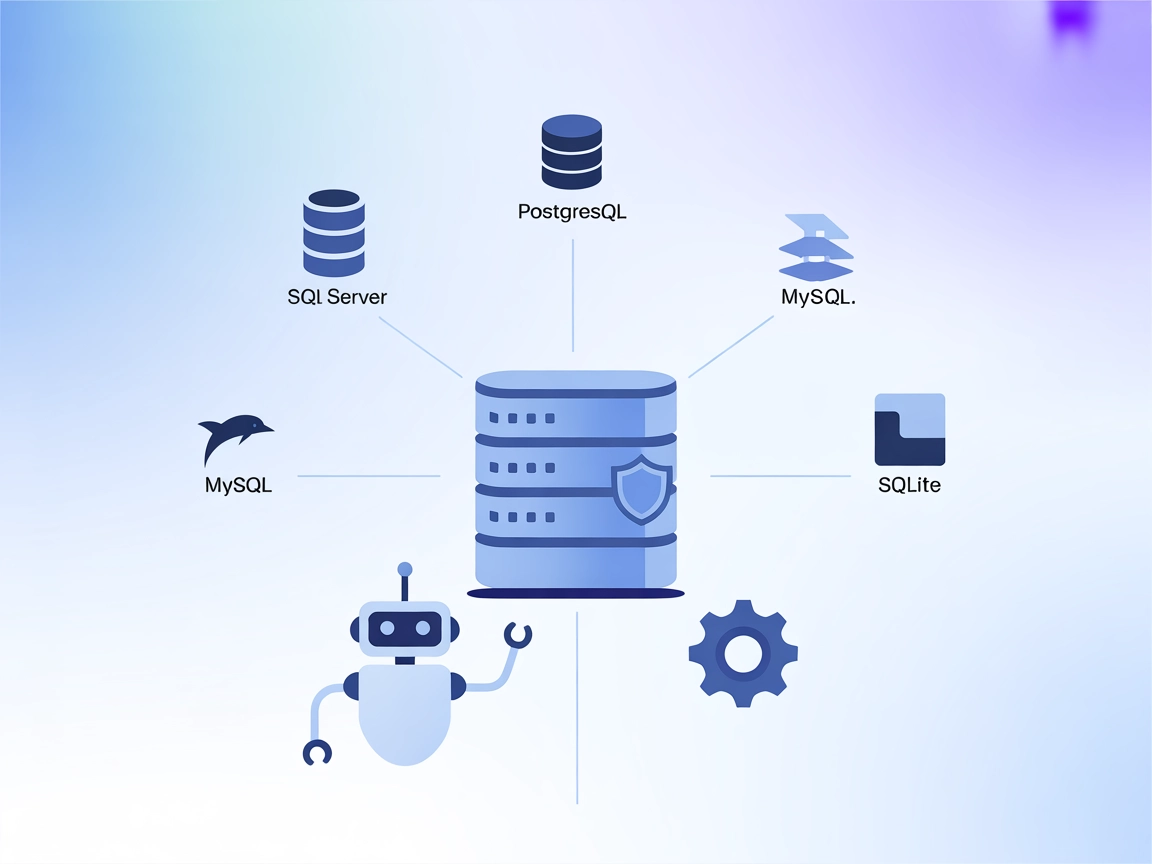
MSSQL MCP Server
The MSSQL MCP Server connects AI assistants with Microsoft SQL Server databases, enabling advanced data operations, business intelligence, and workflow automati...

py-mcp-mssql empowers FlowHunt and AI agents to securely discover, query, and analyze Microsoft SQL Server data in real time using a standardized MCP interface.
FlowHunt provides an additional security layer between your internal systems and AI tools, giving you granular control over which tools are accessible from your MCP servers. MCP servers hosted in our infrastructure can be seamlessly integrated with FlowHunt's chatbot as well as popular AI platforms like ChatGPT, Claude, and various AI editors.
The py-mcp-mssql MCP Server is a Python-based implementation of the Model Context Protocol (MCP) designed to provide seamless access to Microsoft SQL Server databases for AI assistants and language models. By exposing database operations over the MCP interface, this server enables AI clients to inspect SQL table schemas, execute queries, and retrieve data in a standardized format. It leverages asynchronous Python capabilities, environment-based configuration, and FastAPI integration for efficient and reliable operation. This facilitates enhanced development workflows for tasks such as data analysis, report generation, and intelligent database management, making it easier for AI models to interact with enterprise-grade SQL databases securely and programmatically.
No prompt templates are mentioned in the repository or documentation.
Database Tables Listing
The server exposes all available tables in the connected MSSQL database as resources, each represented by a URI (e.g., mssql://<table_name>/data).
Table Data Resource
Enables reading data from any table by referencing its resource URI, returning the first 100 rows as CSV with column headers.
Table Descriptions
When listing resources, table descriptions and MIME types are included for each exposed resource, aiding in context for LLM interactions.
list_resources
Lists all available tables in the MSSQL database, returning resource metadata.
read_resource
Reads data from a specified table URI, returning up to 100 rows in CSV format.
SQL Execution
Supports executing SQL queries via an endpoint, enabling flexible data operations (details referenced but exact tool name not specified).
Database Exploration
AI assistants can list and describe all tables in an MSSQL database, supporting schema discovery and context-building for data science or migration tasks.
Data Analysis and Visualization
Enables AI models to fetch tabular data directly from SQL Server for analysis, visualization, or generating reports, streamlining business analytics workflows.
Automated Report Generation
By leveraging SQL execution and data retrieval, developers can automate creation of data-driven reports or dashboards using AI.
Codebase/Data Integration
Facilitates easy integration of MSSQL data into codebases or other applications via the MCP protocol, supporting ETL and automation pipelines.
API-driven Database Access
Offers a secure, standardized API for accessing enterprise SQL data, making it accessible to various AI-powered tools and workflows.
settings.json)."mcpServers": {
"mssql-mcp": {
"command": "python",
"args": ["-m", "mssql.server"]
}
}
Store your MSSQL credentials in an .env file:
MSSQL_SERVER=your_server
MSSQL_DATABASE=your_database
MSSQL_USER=your_username
MSSQL_PASSWORD=your_password
MSSQL_DRIVER={ODBC Driver 17 for SQL Server}
Example config with env:
"env": {
"MSSQL_SERVER": "your_server",
"MSSQL_DATABASE": "your_db",
"MSSQL_USER": "your_user",
"MSSQL_PASSWORD": "your_password",
"MSSQL_DRIVER": "{ODBC Driver 17 for SQL Server}"
}
"mcpServers": {
"mssql-mcp": {
"command": "python",
"args": ["-m", "mssql.server"]
}
}
pip install -r requirements.txt."mcpServers": {
"mssql-mcp": {
"command": "python",
"args": ["-m", "mssql.server"]
}
}
"mcpServers": {
"mssql-mcp": {
"command": "python",
"args": ["-m", "mssql.server"]
}
}
Using MCP in FlowHunt
To integrate MCP servers into your FlowHunt workflow, start by adding the MCP component to your flow and connecting it to your AI agent:

Click on the MCP component to open the configuration panel. In the system MCP configuration section, insert your MCP server details using this JSON format:
{
"mssql-mcp": {
"transport": "streamable_http",
"url": "https://yourmcpserver.example/pathtothemcp/url"
}
}
Once configured, the AI agent is now able to use this MCP as a tool with access to all its functions and capabilities. Remember to change “mssql-mcp” to whatever the actual name of your MCP server is and replace the URL with your own MCP server URL.
| Section | Availability | Details/Notes |
|---|---|---|
| Overview | ✅ | Describes purpose, features, and core function |
| List of Prompts | ⛔ | No prompt templates found |
| List of Resources | ✅ | Lists tables, table data, and metadata as resources |
| List of Tools | ✅ | Tools: list_resources, read_resource, SQL execution |
| Securing API Keys | ✅ | .env and JSON config examples provided |
| Sampling Support (less important in evaluation) | ⛔ | Not mentioned |
Based on the available information, py-mcp-mssql is a functional MCP server with clear documentation, standard resource and tool exposure, and good setup instructions, but lacks prompt templates and explicit sampling/Roots support. The overall offering is robust for database use cases but may lack advanced MCP features.
| Has a LICENSE | ✅ (MIT) |
|---|---|
| Has at least one tool | ✅ |
| Number of Forks | 11 |
| Number of Stars | 21 |
py-mcp-mssql is a Python-based MCP server that allows AI agents and applications to securely access and interact with Microsoft SQL Server databases using the Model Context Protocol. It exposes tables, data, and SQL execution capabilities over a standardized interface.
It provides access to all MSSQL tables as resources, allows reading up to 100 rows per table in CSV format, and supports listing tables, reading table data, and executing custom SQL queries.
Typical use cases include AI-driven database exploration, data analysis, report generation, ETL automation, and enabling programmatic access to enterprise SQL data for apps and workflows.
Store your MSSQL server credentials in a .env file and reference them via environment variables in your configuration to prevent accidental exposure of sensitive information.
Yes, py-mcp-mssql is open source under the MIT license and is suitable for production use in enterprise and automation scenarios.
Unlock seamless, secure, and programmatic access to Microsoft SQL Server for your AI agents and FlowHunt workflows with py-mcp-mssql.

The MSSQL MCP Server connects AI assistants with Microsoft SQL Server databases, enabling advanced data operations, business intelligence, and workflow automati...

The MCP Database Server enables secure, programmatic access to popular databases like SQLite, SQL Server, PostgreSQL, and MySQL for AI assistants and automation...

The MSSQL MCP Server enables secure, auditable, and structured interaction between FlowHunt and Microsoft SQL Server databases. It supports table listing, data ...